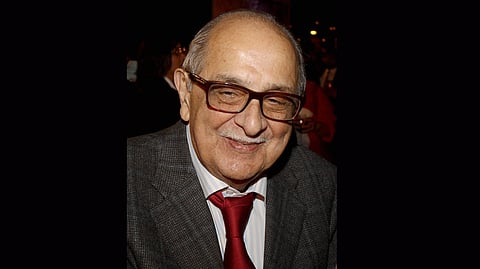

The light has gone out of the legal fraternity's lives. In the death of eminent jurist Fali Nariman, India has lost one of its greatest conscience keepers.
Two memories are abiding.
I had invited Fali to KIIT Law School in 2008. When one speaker went on and on, Nariman asked me to pass the speaker a slip with the note 'KIS I'. As I did not understand, I looked at him and he told me the speaker is to be told to "Keep it short, idiot".
He had also written a personal letter to me on August 18, 2023 appreciating my article that was published in the Indian Express and asked me to write a book. No lawyer and no teacher of law can be found in our country who does not have some such anecdote to tell about him. India's story of law cannot be written without making reference to him.
Fali was born in Rangoon in 1929. He contributed immensely to the initiation of the golden age of Indian Constitutionalism. Following the rich tradition of Parsis from Bombay, Fali dominated the legal profession for over seven decades. By the beginning of the 1970s, he had established himself as a leading advocate and shifted to Delhi. Deeply committed to civil liberties, he had the courage to resign as the Additional Solicitor General of India when Indira Gandhi imposed National emergency in 1975. Few show such courage today.
Fali appeared as a lawyer in almost all historic cases of independent India and his arguments immensely contributed to the development of Jurisprudence of the Supreme Court. He was a staunch supporter of independence of judiciary. He considered the independence of judiciary as the right of people and not the privilege of judges.
He was responsible for the creation of the collegium system in the Second Judges case (1993) when his arguments of 1987 were accepted. This was certainly an improvement over the Government picked system of judicial appointments.
In 2016, Fali again appeared arguing against the National Judicial Appointment Commission which was a big-ticket first constitutional amendment of the Modi Government. As someone who was in a way an architect of the collegium system, Fali Nariman did not hesitate in criticizing the very same collegium system when it failed to recommend the name of Justice S Murlidhar, then Chief Justice of Orissa High Court, for elevation to the Supreme Court. Thus, he spoke truth not only to the government but also to judges.
Fali was highly critical of the Supreme Court's decision to abrogate Article 370 in 2023. He said without mincing words that "the judgment is politically acceptable but constitutionally incorrect".
Fali also appeared in the famous Golaknath Case (1967) in which the Supreme Court had held that Parliament does not have the power to amend the fundamental rights. He has also appeared in the 11 Judge judgment of Supreme Court in the TMA Pai Foundation (2002) case, a landmark ruling on the rights of educational institutions of minorities.
Human beings are fallible and Fali was no exception. He regretted his appearance in the Bhopal Gas Tragedy case. Few lawyers and judges have shown such a courage to admit their own mistakes.
In Fali's death, we have lost a courageous public intellectual, a bold dissenter who was surprised to see no dissenting opinion in the Article 370 judgment and one of the last surviving moralists of our time who believed that silence may not be an option at all when democracy, judicial independence, constitutional ethos and civil liberties are under threat. The defender of constitutional theology is no more.
One final observation. Some newspapers have called Fali the Bhishma Pitamah of the legal fraternity. This is an absolutely wrong description as unlike Bhishma Pitamah who remained silent on several unethical and wrong actions of Duryodhana, Fali always preferred to speak without fearing anyone.